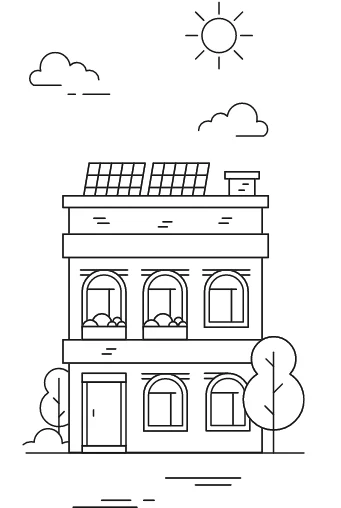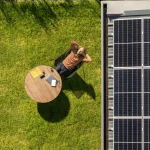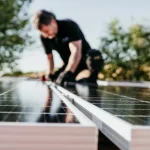4 reasons to choose home solar panels from Soly:
![]() Cutting edge 435W Tier 1 Solar Panels combining quality and affordability
Cutting edge 435W Tier 1 Solar Panels combining quality and affordability
![]() Industry leading performance guarantees for up to 25 years.
Industry leading performance guarantees for up to 25 years.
![]() Low voltage, high safety with our pioneering technology.
Low voltage, high safety with our pioneering technology.
![]() See how much solar power you’re making in real time through our app
See how much solar power you’re making in real time through our app
Jan's Solar Project
Customer Success Story
Want to know what life with solar is like?
We spoke to Soly customer Jan from London, who installed a solar and battery system with us in May 2024. Due to rising energy bills, Jan decided it was time to make the switch to a renewable energy source so she could generate her own electricity to power her household. She received expert advice and was supported throughout her solar journey by her dedicated Soly consultant. Watch Jan’s full interview to hear about her Soly experience and the benefits she is seeing since installation.
*Video Disclaimer – cost of installing the solar system means the electricity isn’t free.
Soly Solar Panel Benefits
Low Maintenance Solar Equipment
Our clients love our low maintenance solar systems. Unlike most solar equipment on the market, Soly 's photovoltaic panels don't require cleaning!
FAQ'sTransparent costs
Thanks to our Online Solar Configurator, you can easily and quickly calculate the cost and yield of your Soly solar panels. Completely online - calculate your solar panels cost today.
More informationHigh quality
Soly solar panel systems are extensively tested and provide high efficiency as the standard. You'll enjoy pure, lasting quality green energy. Not to mention our 25 year guarantee!
More informationChoosing Your Solar Panel System
Choose between series solar panels, which are optimal in direct sunlight, and parallel solar systems, which are best for roofs with mixed-light conditions. Then calculate your solar pv system costs which consider your roof type, the angle & inclination, materials required for installation, and whether you’ve chosen the series or parallel system. Start calculating here or contact us for more information.
6 Solar Panels
The amount of solar panels for your home will depend on your energy needs. The 6 solar panels cost is easily estimated online – no hidden fees or costs when you choose solar panels for your home with Soly!
10 Solar Panels
For larger homes, consider this slightly larger solar panel system starting at £5,000 including installation and at 0% VAT. Calculating your 10 solar panels cost online with Soly is both easy and accurate. No hidden fees, no surprise costs!
Get the complete system
Solar panels
Microinverter
Home battery
Get the complete system
Visible base
Our powerful solar panel systems convert the sun’s energy into energy usable in the home.
✓ Proven robustness
Soly solar panels are extensively tested for quality, service life, and efficiency.
✓ High peak power
Enjoy high yields from day one. The best combination of quality and price when you install solar with Soly.
✓ Long service life
You can expect a long and solid service life. This is described in our solar equipment production guarantee.

Energy
Microinverters
Heart of the system
The inverter converts the direct current – generated by your photovoltaic panels – into alternating current. We use that alternating current to power your home with clean, economical energy. A natural and complete consumption. Very convenient in this day and age.

Sustainable
Home battery
Storing solar energy
If you want to take full advantage of your own generated solar energy, it’s a good idea to get a home battery. This allows you to temporarily store the power generated by your solar panel system during the day, so that you also benefit from green solar energy in the evening*.
*Dependent on generation and battery size.

Get the complete system
Get the complete system
Visible base
Our powerful solar panel systems convert the sun’s energy into energy usable in the home.
✓ Proven robustness
Soly solar panels are extensively tested for quality, service life, and efficiency.
✓ High peak power
Enjoy high yields from day one. The best combination of quality and price when you install solar with Soly.
✓ Long service life
You can expect a long and solid service life. This is described in our solar equipment production guarantee.

Microinverters
Heart of the system
The inverter converts the direct current – generated by your photovoltaic panels – into alternating current. We use that alternating current to power your home with clean, economical energy. A natural and complete consumption. Very convenient in this day and age.

Home battery
Storing solar energy
If you want to take full advantage of your own generated solar energy, it’s a good idea to get a home battery. This allows you to temporarily store the power generated by your solar panel system during the day, so that you also benefit from green solar energy in the evening*.
*Dependent on generation and battery size.

Taking Ownership
The number of rooftops equipped with solar panels is growing rapidly in the United Kingdom. An increasing number of households are realising the benefit of 100% clean energy and choosing to be less dependent on the energy grid. A sustainable move that is kind to your wallet and to the planet. Are you ready to make the switch to solar? Find out more about solar panels from Soly.
Purchasing solar panels
When you purchase solar panels with Soly, you maintain full ownership of your solar system. Your home solar panel system immediately starts to earn back your spend. Seven to eight years in, your decision to go green will have earned back the cost of your solar panel investment*. After this, you will be able to enjoy a cost-effective system for many years to come – along with up to a 25 year warranty we offer our clients!
Advantages of solar panels
The first step to a sustainable future – discover the financial and environmental advantages when you power your home with solar. Save on your energy bills and contribute to a world that’s a little bit cleaner and more sustainable.
Yield You Can Count On
Benefit from green energy
We’ve designed our process to be faster, clearer, and more cost-effective for our clients. From start to finish, you can expect premium quality, excellent customer service, and industry leading benefits with Soly solar panels for your home.
Your Solar Panel Specialist in the UK
With over 800,000 solar panels installed worldwide, 217,500,000 kWh of renewable solar energy generated per year by our clients, and a 4.8 rating on Google – you can rest assured you’ve chosen the right solar install specialists for your green energy needs!
We strive to make solar energy accessible to all UK residents. All of our trusted local installers are accredited by HIES, trustMark, Which? Trusted Trader, and MCS. The goal is to become carbon neutral by 2030, and every solar panel installed is a step towards this! Find out about the possibilities of solar panels and how you can generate and use fully decentralised energy now and in the future.
Regional orientation
Soly is your regional partner when it comes to solar panels. You can always find us nearby in, among others, Manchester, London, Newcastle, Birmingham and Exeter – and we’re always happy to help!
Invest in your home
Solar panels are a great addition to any home. From increasing home value to savings on monthly electricity bills, going solar is an investment that immediately starts to pay back its cost.
Good for our world
Caring for our environment is crucial – but it’s not always affordable. Solar panels are one of the only sustainable living options that are also good for our wallet! Become less dependent on outdated fossil energy sources, and separate yourself from the electrical grid.
Finance Available
Pay while you save with Hometree Finance
£0 UPFRONT/FROM £75 A MONTH*
Soly has partnered with Hometree Finance to make it easy for you to switch to clean, renewable power and start saving on your energy bills. With no upfront cost and prices from just £75 a month, the Solar Plan includes equipment, installation, monitoring and maintenance, to give you complete peace of mind.
*Price varies, apply for your personal quote. Offers are subject to status and finance agreement.
Soly UK Operations Limited is an appointed representative of the HTG Finance Limited which is authorised and regulated by the Financial Conduct Authority.
Knowledge Base





